Successfully reported this slideshow.
Your SlideShare is downloading.
Cassandra 2.1 boot camp, Protocol, Queries, CQL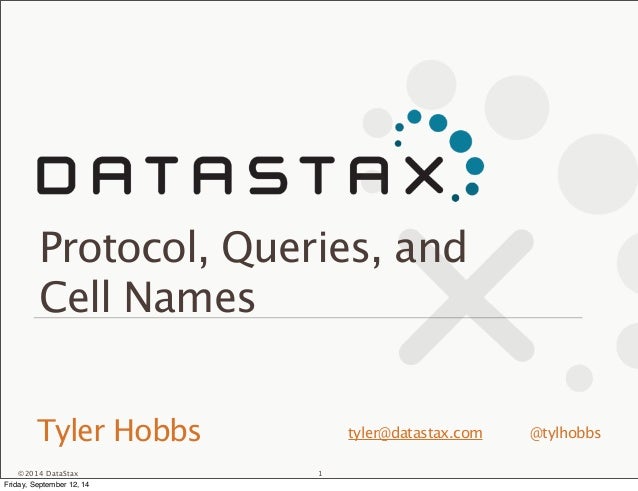
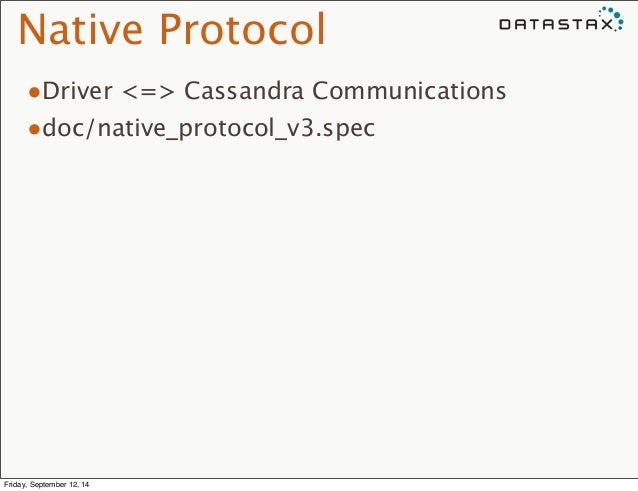
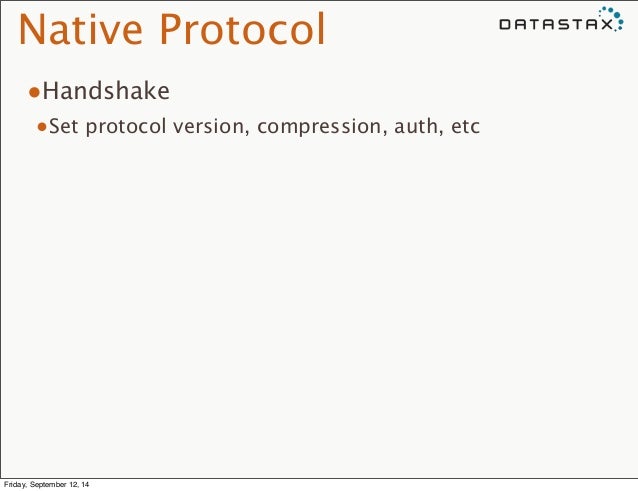
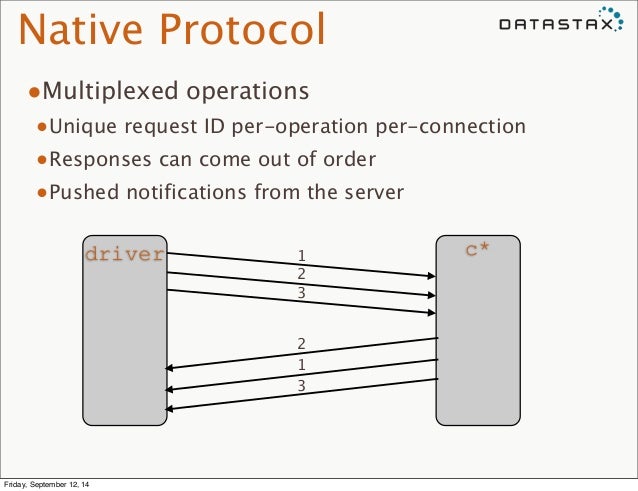
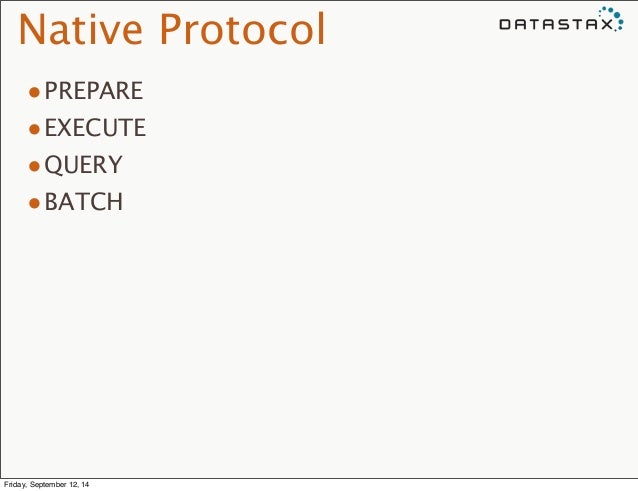
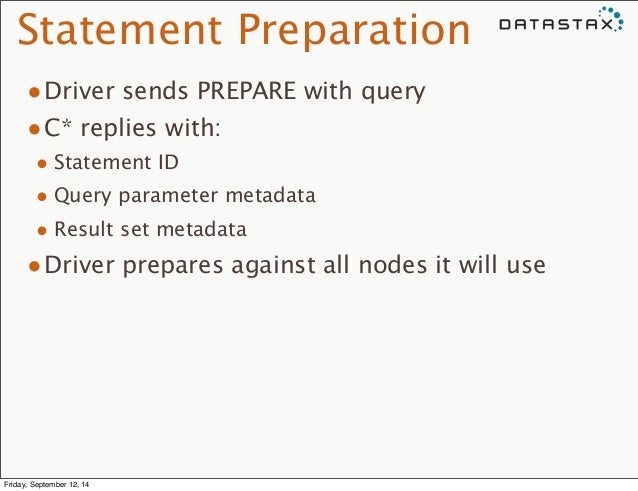
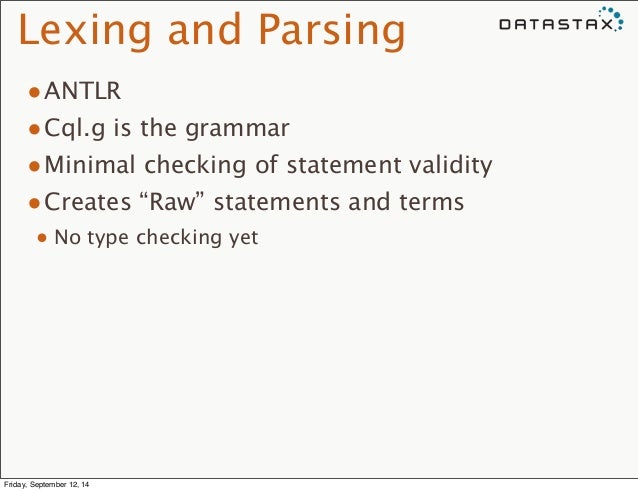
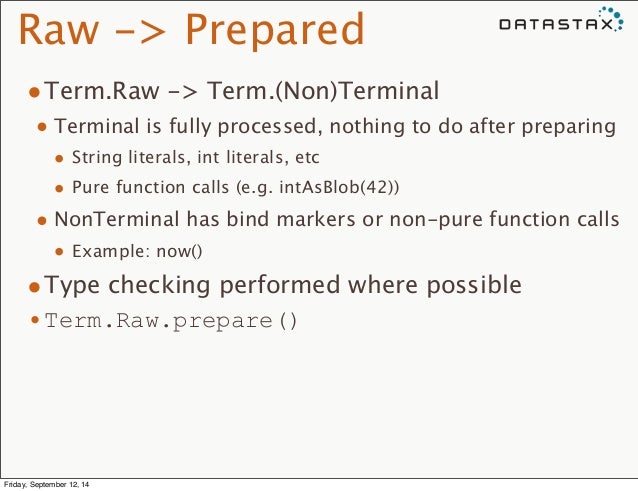
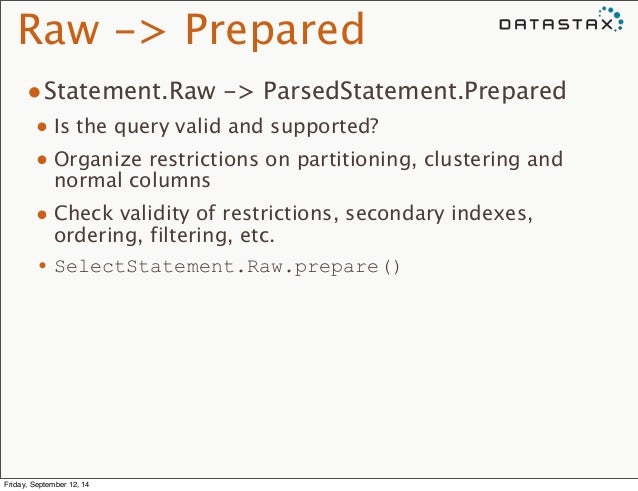
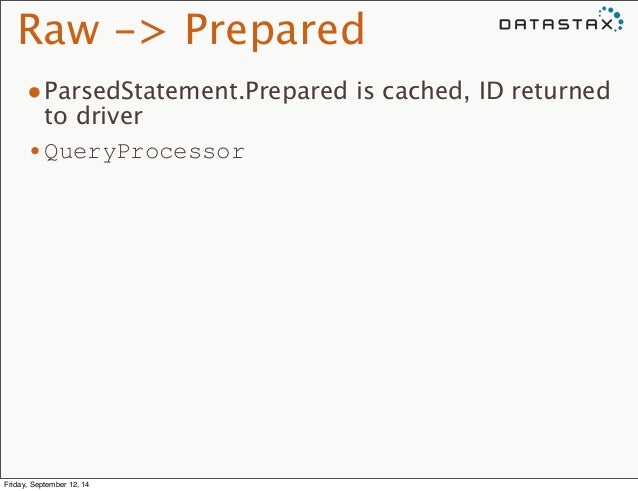
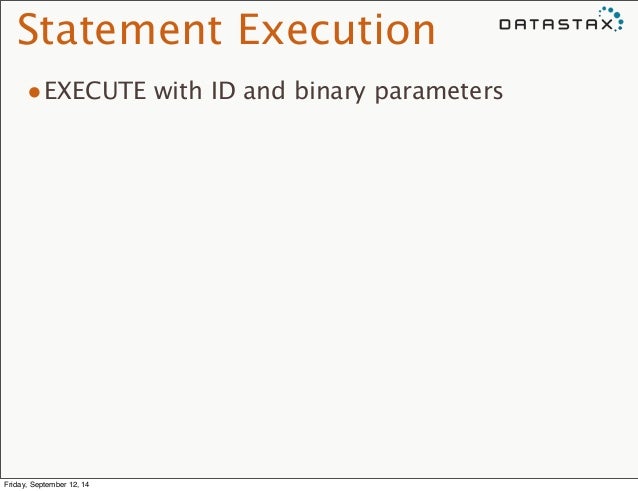
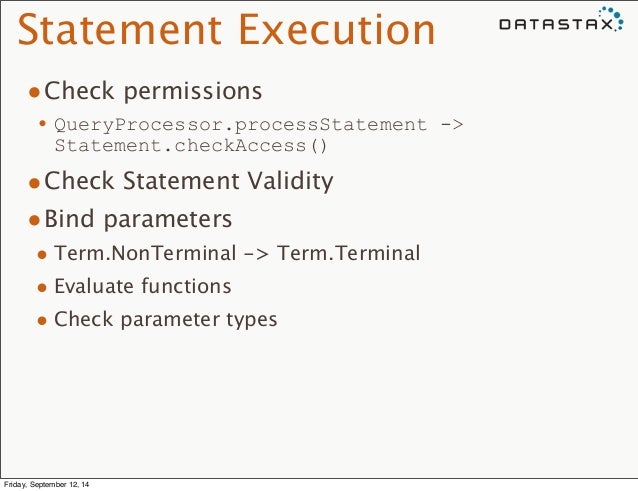
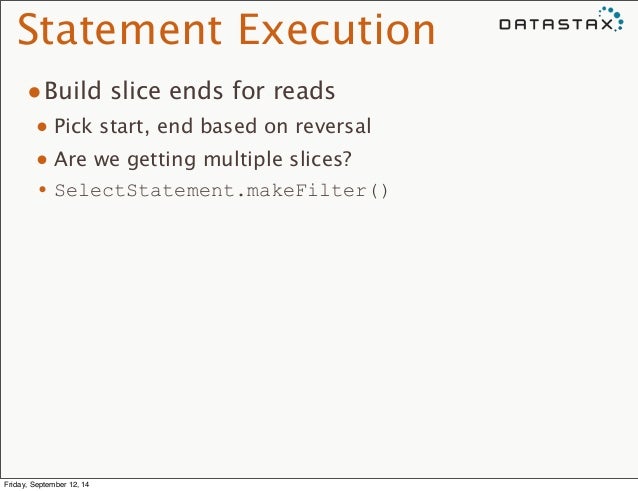
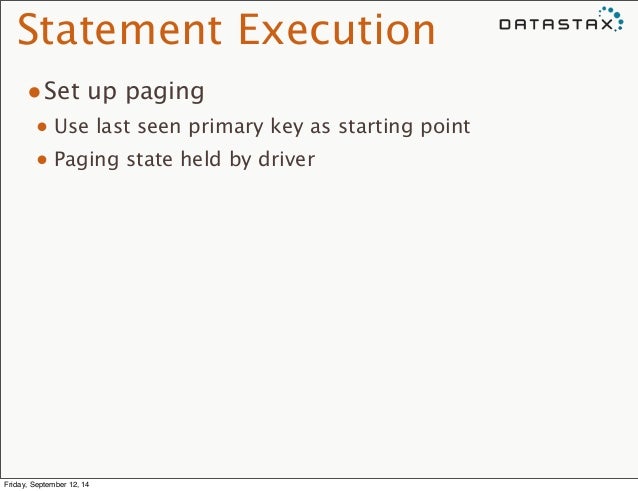
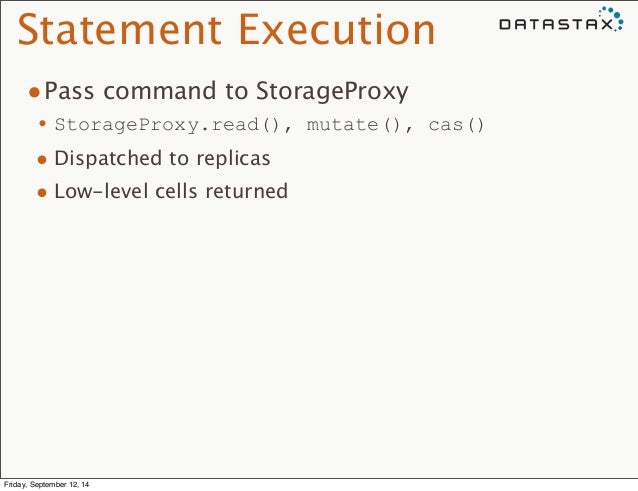
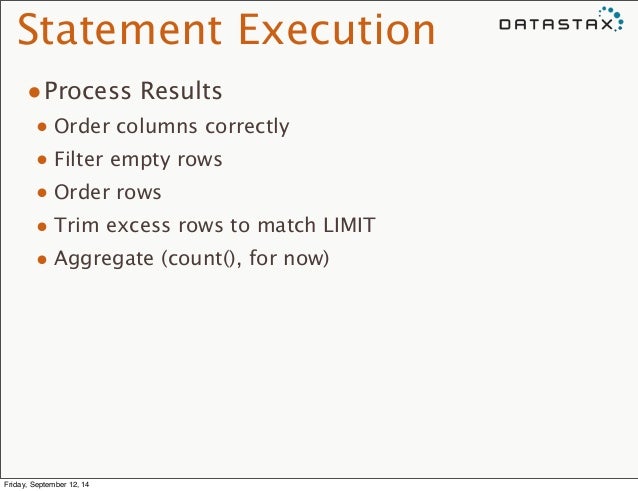
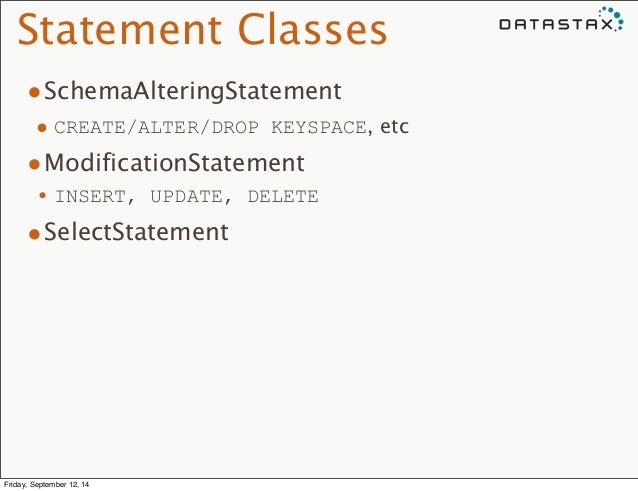
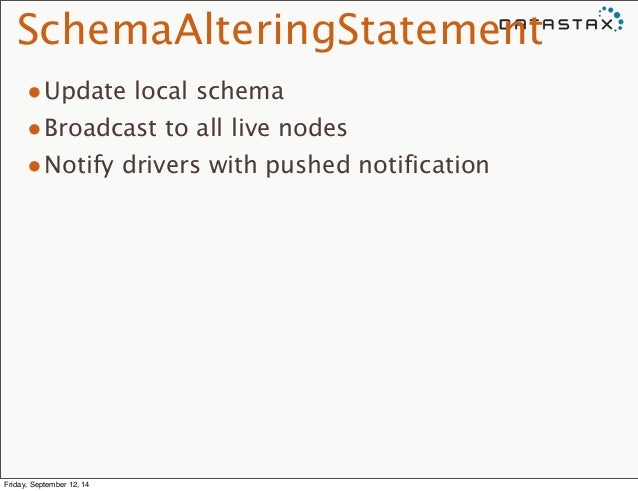
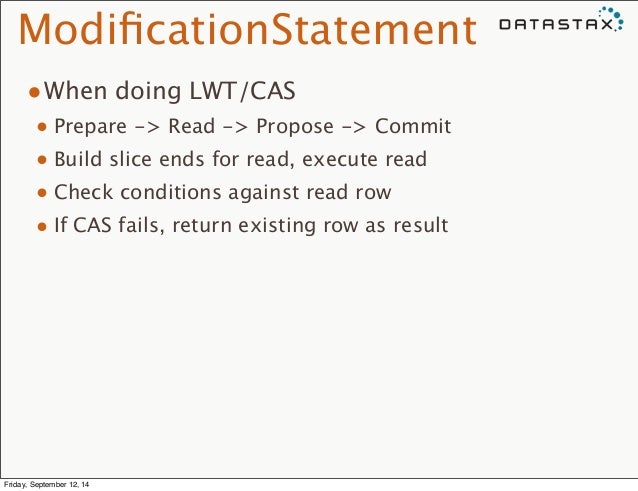
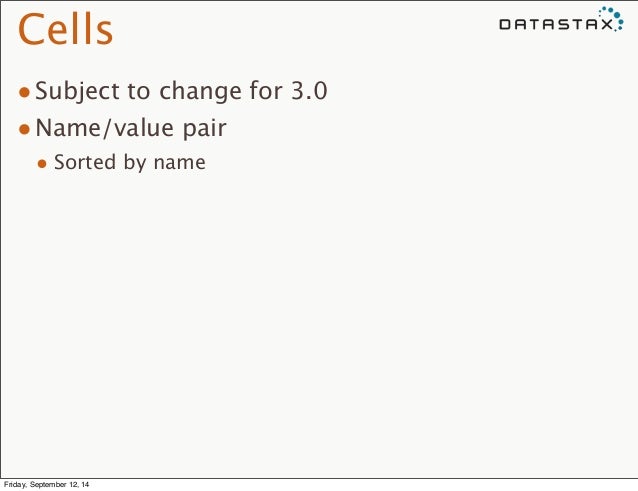
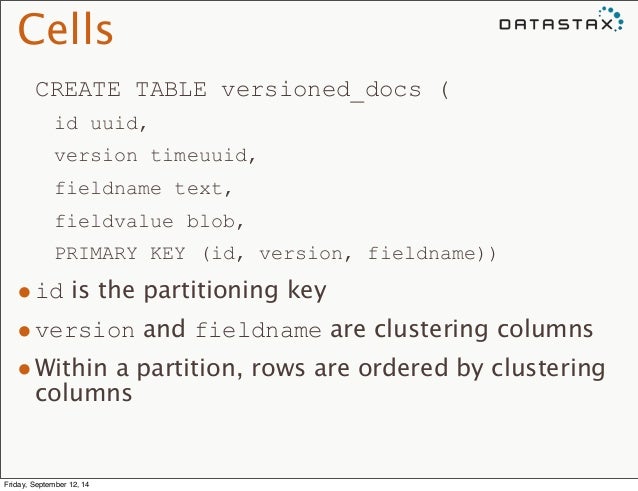
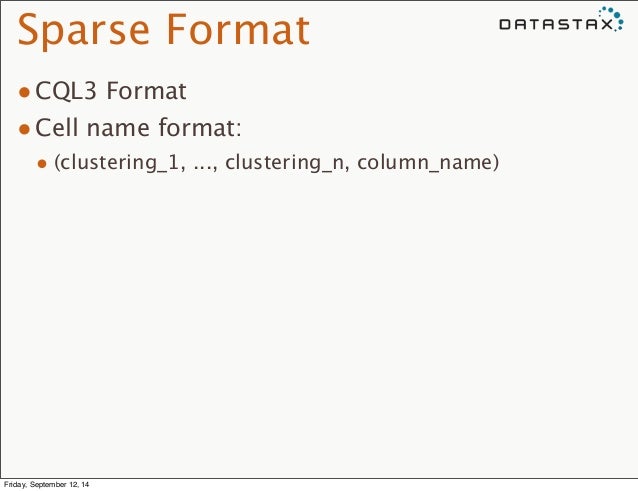
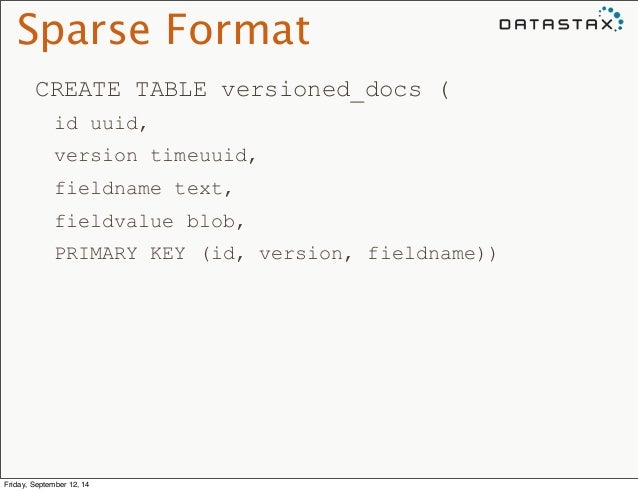
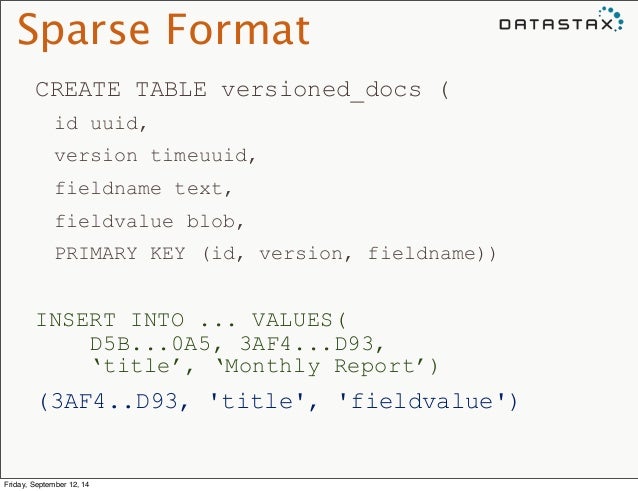
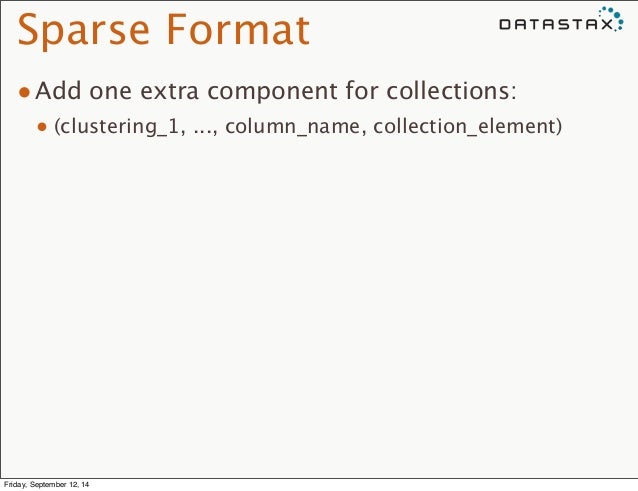

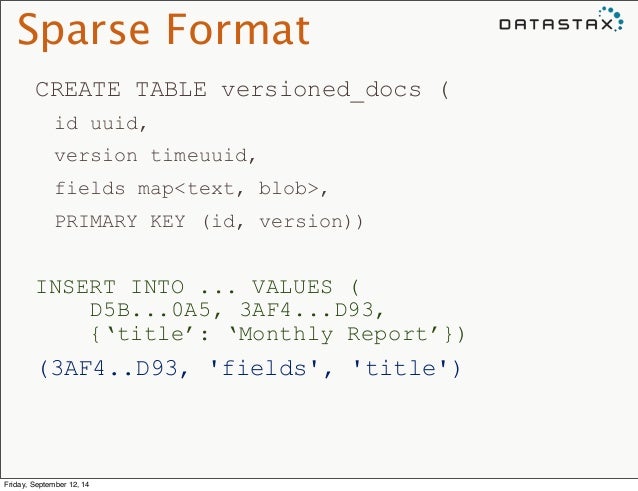
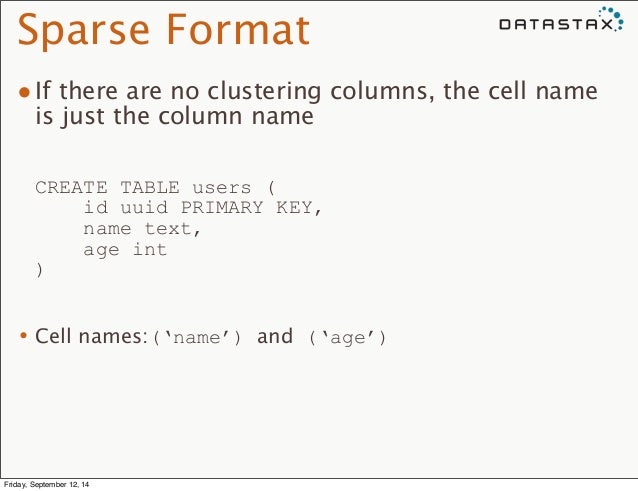
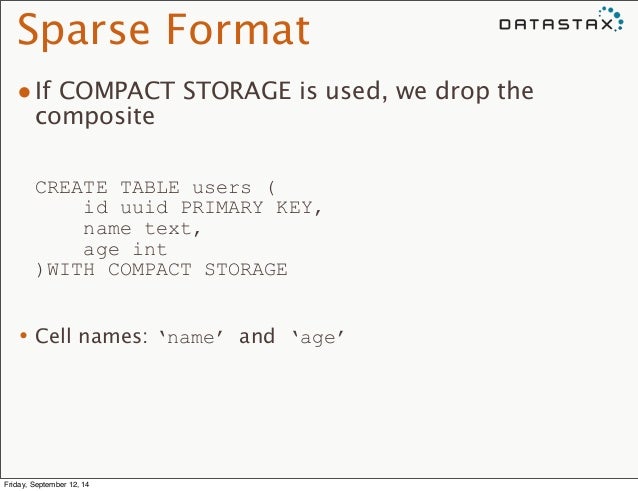
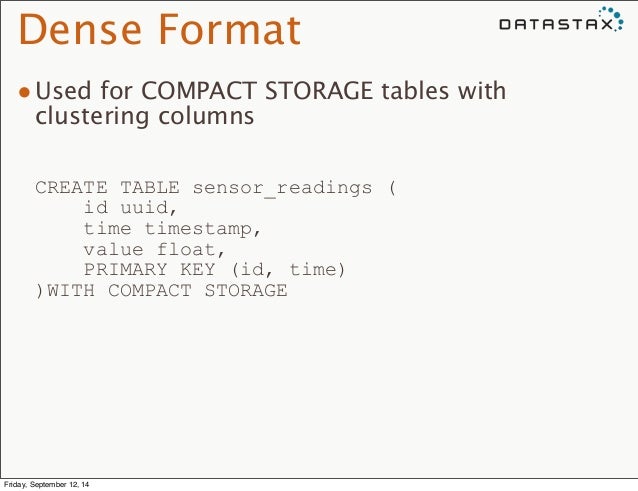
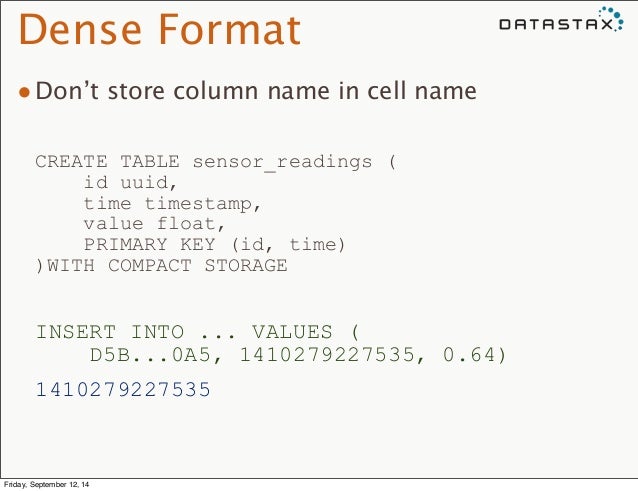
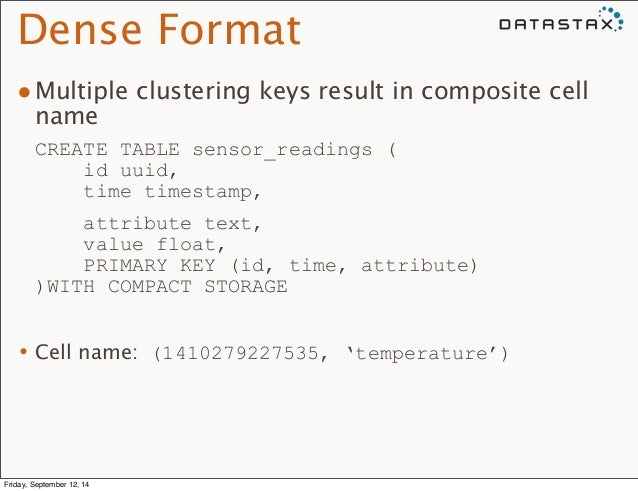
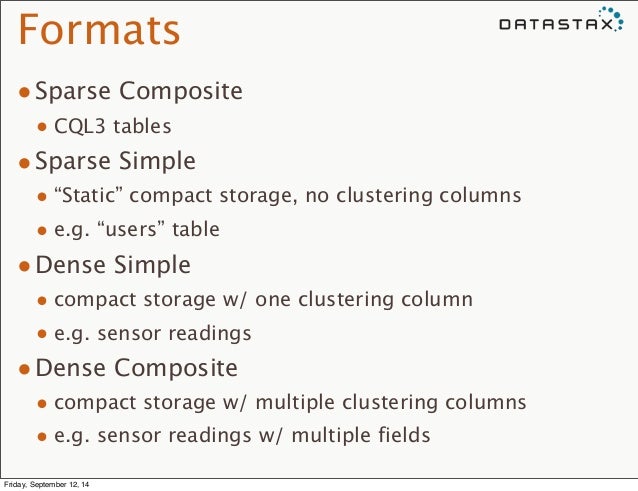
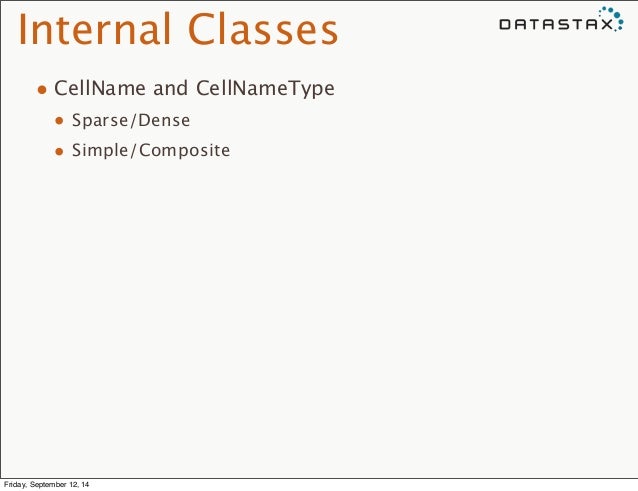




































Upcoming SlideShare
Loading in …5
×
-
Be the first to like this
No notes for slide
- 1. Protocol, Queries, and Cell Names Tyler Hobbs ©2014 DataStax 1 tyler@datastax.com @tylhobbs Friday, September 12, 14
- 2. Native Protocol •Driver <=> Cassandra Communications •doc/native_protocol_v3.spec Friday, September 12, 14
- 3. Native Protocol •Handshake •Set protocol version, compression, auth, etc Friday, September 12, 14
- 4. Native Protocol •Multiplexed operations •Unique request ID per-operation per-connection •Responses can come out of order •Pushed notifications from the server driver c* 12 3 2 1 3 Friday, September 12, 14
- 5. Native Protocol •PREPARE •EXECUTE •QUERY •BATCH Friday, September 12, 14
- 6. Statement Preparation •Driver sends PREPARE with query •C* replies with: • Statement ID • Query parameter metadata • Result set metadata •Driver prepares against all nodes it will use Friday, September 12, 14
- 7. Lexing and Parsing •ANTLR •Cql.g is the grammar •Minimal checking of statement validity •Creates “Raw” statements and terms • No type checking yet Friday, September 12, 14
- 8. Raw -> Prepared •Term.Raw -> Term.(Non)Terminal • Terminal is fully processed, nothing to do after preparing • String literals, int literals, etc • Pure function calls (e.g. intAsBlob(42)) • NonTerminal has bind markers or non-pure function calls • Example: now() •Type checking performed where possible •Term.Raw.prepare() Friday, September 12, 14
- 9. Raw -> Prepared •Statement.Raw -> ParsedStatement.Prepared • Is the query valid and supported? • Organize restrictions on partitioning, clustering and normal columns • Check validity of restrictions, secondary indexes, ordering, filtering, etc. •SelectStatement.Raw.prepare() Friday, September 12, 14
- 10. Raw -> Prepared •ParsedStatement.Prepared is cached, ID returned to driver •QueryProcessor Friday, September 12, 14
- 11. Statement Execution •EXECUTE with ID and binary parameters Friday, September 12, 14
- 12. Statement Execution •Check permissions •QueryProcessor.processStatement -> Statement.checkAccess() •Check Statement Validity •Bind parameters • Term.NonTerminal -> Term.Terminal • Evaluate functions • Check parameter types Friday, September 12, 14
- 13. Statement Execution •Build slice ends for reads • Pick start, end based on reversal • Are we getting multiple slices? •SelectStatement.makeFilter() Friday, September 12, 14
- 14. Statement Execution •Set up paging • Use last seen primary key as starting point • Paging state held by driver Friday, September 12, 14
- 15. Statement Execution •Pass command to StorageProxy •StorageProxy.read(), mutate(), cas() • Dispatched to replicas • Low-level cells returned Friday, September 12, 14
- 16. Statement Execution •Process Results • Order columns correctly • Filter empty rows • Order rows • Trim excess rows to match LIMIT • Aggregate (count(), for now) Friday, September 12, 14
- 17. Statement Classes •SchemaAlteringStatement • CREATE/ALTER/DROP KEYSPACE, etc •ModificationStatement •INSERT, UPDATE, DELETE •SelectStatement Friday, September 12, 14
- 18. SchemaAlteringStatement •Update local schema •Broadcast to all live nodes •Notify drivers with pushed notification Friday, September 12, 14
- 19. ModificationStatement •When doing LWT/CAS • Prepare -> Read -> Propose -> Commit • Build slice ends for read, execute read • Check conditions against read row • If CAS fails, return existing row as result Friday, September 12, 14
- 20. Cells •Subject to change for 3.0 •Name/value pair • Sorted by name Friday, September 12, 14
- 21. Cells CREATE TABLE versioned_docs ( id uuid, version timeuuid, fieldname text, fieldvalue blob, PRIMARY KEY (id, version, fieldname)) •id is the partitioning key •version and fieldname are clustering columns •Within a partition, rows are ordered by clustering columns Friday, September 12, 14
- 22. Sparse Format •CQL3 Format •Cell name format: • (clustering_1, ..., clustering_n, column_name) Friday, September 12, 14
- 23. Sparse Format CREATE TABLE versioned_docs ( id uuid, version timeuuid, fieldname text, fieldvalue blob, PRIMARY KEY (id, version, fieldname)) Friday, September 12, 14
- 24. Sparse Format CREATE TABLE versioned_docs ( id uuid, version timeuuid, fieldname text, fieldvalue blob, PRIMARY KEY (id, version, fieldname)) INSERT INTO ... VALUES( D5B...0A5, 3AF4...D93, ‘title’, ‘Monthly Report’) (3AF4..D93, 'title', 'fieldvalue') Friday, September 12, 14
- 25. Sparse Format •Add one extra component for collections: • (clustering_1, ..., column_name, collection_element) Friday, September 12, 14
- 26. Sparse Format CREATE TABLE versioned_docs ( id uuid, version timeuuid, fields map<text, blob>, PRIMARY KEY (id, version)) Friday, September 12, 14
- 27. Sparse Format CREATE TABLE versioned_docs ( id uuid, version timeuuid, fields map<text, blob>, PRIMARY KEY (id, version)) INSERT INTO ... VALUES ( D5B...0A5, 3AF4...D93, {‘title’: ‘Monthly Report’}) (3AF4..D93, 'fields', 'title') Friday, September 12, 14
- 28. Sparse Format •If there are no clustering columns, the cell name is just the column name CREATE TABLE users ( id uuid PRIMARY KEY, name text, age int ) •Cell names:(‘name’) and (‘age’) Friday, September 12, 14
- 29. Sparse Format •If COMPACT STORAGE is used, we drop the composite CREATE TABLE users ( id uuid PRIMARY KEY, name text, age int )WITH COMPACT STORAGE •Cell names: ‘name’ and ‘age’ Friday, September 12, 14
- 30. Dense Format •Used for COMPACT STORAGE tables with clustering columns CREATE TABLE sensor_readings ( id uuid, time timestamp, value float, PRIMARY KEY (id, time) )WITH COMPACT STORAGE Friday, September 12, 14
- 31. Dense Format •Don’t store column name in cell name CREATE TABLE sensor_readings ( id uuid, time timestamp, value float, PRIMARY KEY (id, time) )WITH COMPACT STORAGE INSERT INTO ... VALUES ( D5B...0A5, 1410279227535, 0.64) 1410279227535 Friday, September 12, 14
- 32. Dense Format •Multiple clustering keys result in composite cell name CREATE TABLE sensor_readings ( id uuid, time timestamp, attribute text, value float, PRIMARY KEY (id, time, attribute) )WITH COMPACT STORAGE •Cell name: (1410279227535, ‘temperature’) Friday, September 12, 14
- 33. Formats •Sparse Composite • CQL3 tables •Sparse Simple • “Static” compact storage, no clustering columns • e.g. “users” table •Dense Simple • compact storage w/ one clustering column • e.g. sensor readings •Dense Composite • compact storage w/ multiple clustering columns • e.g. sensor readings w/ multiple fields Friday, September 12, 14
- 34. Internal Classes • CellName and CellNameType • Sparse/Dense • Simple/Composite Friday, September 12, 14
- 35. Questions? @tylhobbs tyler@datastax.com Friday, September 12, 14
Cassandra Summit Boot Camp, 2014 Protocol, Queries, and Cell Names Tyler Hobbs presenter
Public clipboards featuring this slide
No public clipboards found for this slide





